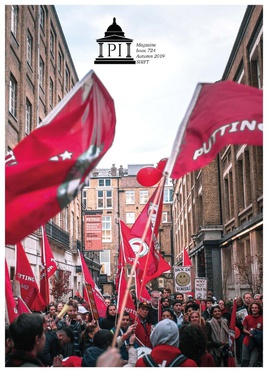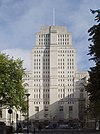University College London is a public research university in London, England. It is a member institution of the federal University of London, and is the second-largest university in the United Kingdom by total enrolment and the largest by postgraduate enrolment.

The Independent is a British online newspaper. It was established in 1986 as a national morning printed paper. Nicknamed the Indy, it began as a broadsheet and changed to tabloid format in 2003. The last printed edition was published on Saturday 26 March 2016, leaving only the online edition.

The News of the World was a weekly national "red top" tabloid newspaper published every Sunday in the United Kingdom from 1843 to 2011. It was at one time the world's highest-selling English-language newspaper, and at closure still had one of the highest English-language circulations. It was originally established as a broadsheet by John Browne Bell, who identified crime, sensation and vice as the themes that would sell most copies. The Bells sold to Henry Lascelles Carr in 1891; in 1969, it was bought from the Carrs by Rupert Murdoch's media firm News Limited. Reorganised into News International, a subsidiary of News Corporation, the newspaper was transformed into a tabloid in 1984 and became the Sunday sister paper of The Sun.

The Star is an English-language newspaper in Malaysia. Based in Petaling Jaya, it was established in 1971 as a regional newspaper in Penang. It is the largest paid English newspaper in terms of circulation in Malaysia, according to the Audit Bureau of Circulations. It has a daily circulation of about 250,000, far eclipsing the circulation of its next-largest paid English-language competitor, the New Straits Times.
The New Straits Times is an English-language newspaper published in Malaysia. It is Malaysia's oldest newspaper still in print, having been founded as a local offshoot of Singapore-based The Straits Times on 15 July 1845. It was renamed as the New Straits Times on 13 August 1974.

Toby Daniel Moorsom Young is a British social commentator. He is the founder and director of the Free Speech Union, an associate editor of The Spectator, and a former associate editor at Quillette.

Varsity is the oldest of Cambridge University's main student newspapers. It has been published continuously since 1947 and is one of only three fully independent student newspapers in the UK. It moved back to being a weekly publication in Michaelmas 2015, and is published every Friday during term time.

Nouse is a student newspaper and website at the University of York. It is the oldest registered society of, and funded by, the University of York Students' Union. Nouse was founded in 1964 by student Nigel Fountain, some twenty years before its rival York Vision. The newspaper is printed three times in each of the Autumn and Spring terms, and twice in the Summer term, with frequent website updates in between print runs. As of June 2022, Nouse has printed 500 editions.

UCL Pi Media is the oldest and largest student journalism society at University College London Union. Initially launched as a newspaper in 1946 and named after former Provost David Pye, it now publishes on three platforms: Pi Online, Pi Magazine and PiTV.

The Hoya, founded in 1920, is the oldest and largest student newspaper of Georgetown University in Washington, D.C., serving as the university’s newspaper of record. The Hoya is a student-run paper that prints every Friday and publishes online daily throughout the year, with a print circulation of 4,000 during the academic year. The newspaper has four main editorial sections: News, Opinion, Science, Sports and The Guide, a weekly arts and lifestyle magazine. It also publishes several annual special issues including a New Student Guide, a basketball preview and a semesterly fashion issue.

Exeposé is the official student-run newspaper of the University of Exeter. It has a fortnightly print circulation of 1,000. Exeposé is free and published every fortnight during term time. Its sections include news, features, lifestyle, science, satire, sport, screen, music, arts and lit, tech, comment and international.

The Medical Student (TMS) is a monthly print newspaper published entirely by full-time medical students from the five medical schools in London (King's College London School of Medicine and Dentistry, Imperial College School of Medicine, Barts and The London School of Medicine and Dentistry, UCL Medical School, St George's, University of London). TMS is affiliated to London Medgroup, a collective body of Students' Union presidents and British Medical Association representatives from each of the five member medical schools.
Portland State Vanguard, formerly known as the Daily Vanguard and Vet's Extended, is an independent student newspaper for Portland State University, in Portland, Oregon, United States.

Redbrick is the student newspaper of the University of Birmingham. Originally titled Guild News, the newspaper was renamed Redbrick in 1962. As with most student newspapers, Redbrick is not fully independent due to funding arrangements, but is editorially independent as is set out in its charter.

Palatinate is the student newspaper of Durham University. One of Britain's oldest student publications, Palatinate is frequently ranked as one of the leading student outlets in the UK and Ireland, winning Best Publication in the Student Publication Association's 2018 and 2021 national awards. In the same year Palatinate was Highly Commended in the Best Publication category of the BBC Radio 4 Today Programme's Student Journalism Awards. Several of its editors have gone on to gain national recognition in journalism.
The Mail on Sunday is a British conservative newspaper, published in a tabloid format. It is the biggest-selling Sunday newspaper in the UK and was founded in 1982 by Lord Rothermere. Its sister paper, the Daily Mail, was first published in 1896.

York Vision is one of two student newspapers at the University of York. Vision is a registered society of, and is funded by the University of York Students' Union (YUSU).

Roar News is the student newspaper of King's College London. It is editorially independent of both the university and the students' union.

Gerhard Meisenberg is a German biochemist. As of 2018, he was a professor of physiology and biochemistry at Ross University School of Medicine in Dominica. He is a director, with Richard Lynn, of the Pioneer Fund, which has been described as a hate group by the Southern Poverty Law Center. He was, until 2018 or 2019, the editor-in-chief of Mankind Quarterly, which is commonly described as a white supremacist journal and purveyor of scientific racism.
The London Conference on Intelligence (LCI) is an invitation-only conference for research on human intelligence, including race and intelligence and eugenics. In 2018, Times Higher Education called it "an annual conference on eugenics and intelligence" and several news outlets have described the conference as having ties to white supremacy, neo-Nazism, and scientific racism.
















